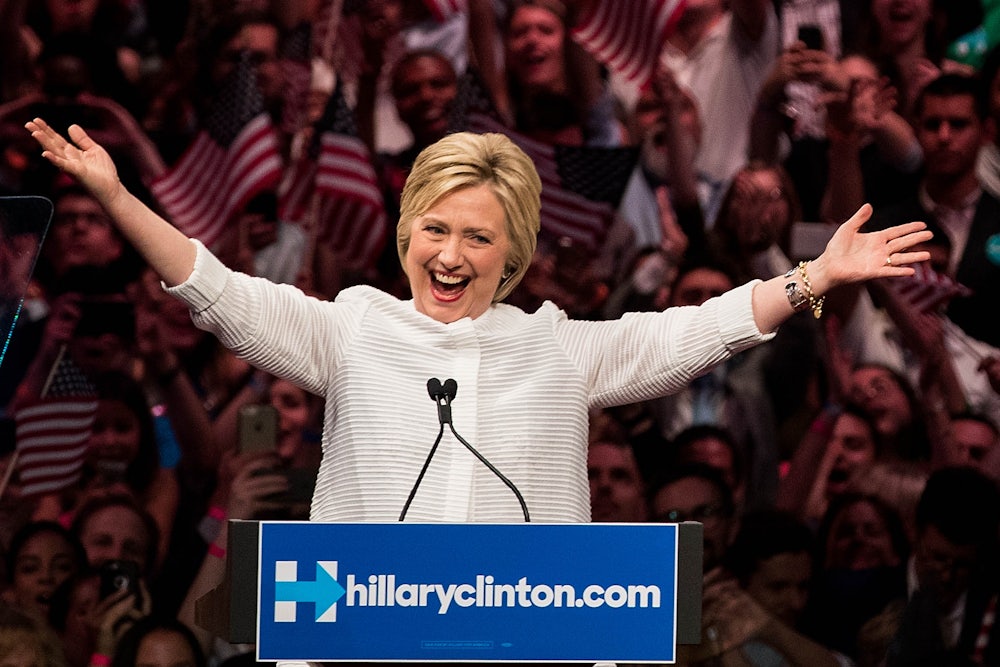Hillary Clinton has made history: She is now the first presumptive female nominee of a major political party, and, by most polls, on track to becoming the first female president. Even the New York Post, not exactly a hotbed of feminist awareness or a newspaper friendly toward the Clintons, recognized the pathbreaking nature of the night. The Post’s headline on Wednesday’s cover reads, “THE FIRST LADY: Hill makes history as female nominee.” Until Tuesday night, there was surprisingly little discussion of how historic Clinton’s run is, especially compared to the Niagara of commentary in 2008 about Barack Obama as the first African American nominee.
There are many reasons why the reaction to Clinton as feminist pioneer have been muted. Unlike Obama, she’s not an exciting new figure on the political stage. She’s been a national figure since the 1990s and her long proximity to power (as first lady, senator, and secretary of state) give her an impressive resume but make it hard to see her as an underdog fighting against the odds. So, too, the grueling and lengthy primary season has taken its toll, with supporters of Clinton and Bernie Sanders engaged in dispiriting arguments, especially on social media. Political writer Naomi Klein spoke for many on the left when she disputed on Twitter the idea that Clinton had broken an important glass ceiling: “As a feminist, I should feel a thrill right now. I grieve that I don’t.”
Yet as the general election race looms as a contest between Donald Trump and Clinton, the Democratic candidate has a chance to reboot her image as a feminist, since that identity will be especially salient against the real estate mogul. Trump is, among his other attributes, America’s most notorious misogynist. As ads from Clinton-friendly super PACs make clear, Trump has a long history of denigrating women, referring to them as “pigs” and “dogs.” More broadly, Trump’s whole campaign is based on white male nostalgia for the days when America was “great” because the right people (i.e. white men like Trump) ran things authoritatively and without challenge.
Clinton, as it happens, is the perfect candidate to stand up to Trump’s politics of resurgent sexism. She has spent many years honing her response to precisely the kinds of attacks that Trump will use against her.
Trump is a mud-slinger who gleefully tries to slime his opponents. Clinton is a survivor of slander-mongering, having lived through the 1990s, when her husband’s sex life was made public and she was accused of everything from murdering supposed lover Vince Foster to being a lesbian. Unlike Jeb Bush or Marco Rubio, Clinton won’t crumple under Trump’s politics of personal destruction since she’s survived some of the the worst attacks any public figure has received.
Trump practices dominance politics, which involves intimidating rivals. But Clinton happens to be the type of person that Trump himself is intimidated by: a strong woman. Based on his experiences with Fox News’ Megyn Kelly and former GOP candidate Carly Fiorina, we know Trump is unnerved when challenged by assertive members of the opposite sex. Being mocked by a woman like Clinton is Trump’s worst nightmare, and he’s going to have to get used to it from now until November.
Finally, Trump is a racist whose political strength comes from appealing to white resentment. But over the course of the primaries, Clinton has shown she can appeal to the only coalition that can defeat this sort of racism—the multicultural coalition that twice elected Obama. While Sanders has performed best in states that were overwhelmingly white, Clinton has been strongest in states that were diverse. This means she knows how to appeal to the national Democratic coalition that needs to reassemble to vanquish Trump.
If Clinton wins in the fall, she’ll be a feminist heroine twice over: not just the first female president, but also the president who squashed the most repellent sexist in American public life.
